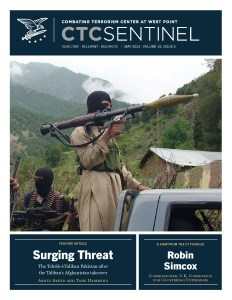From the Editor
With Pakistan engulfed by political and economic turmoil, the Tehrik-i-Taliban Pakistan (TTP)—better known as the Pakistani Taliban—is again growing as a threat. In our feature article, Abdul Sayed and Tore Hamming write: “With the Taliban’s victory in Afghanistan, the TTP has obtained new more sophisticated weapons and relocated fighters from Afghanistan to Pakistan and is now turning its focus back to its war against the Pakistani state. Over the past two years, the group has gone through a series of mergers, strengthened its media and operational activities, moved away from the indiscriminate targeting of civilians in suicide attacks, implemented a range of new internal policies centralizing its organizational structure, and settled on a localized strategy. With a solid organizational foundation and its eyes set on the Pakistani state, the TTP appears ready to follow in the footsteps of the Afghan Taliban and take control of territory in Pakistan’s tribal areas. The Taliban victory in Afghanistan has emboldened and strengthened the TTP. With the Taliban in control of Afghanistan and sympathetic to the TTP, the TTP now enjoys a level of ‘strategic depth’ that is arguably unparalleled in its history.”
Our interview is with Robin Simcox, the United Kingdom’s Commissioner for Countering Extremism. He talks about tackling violent and non-violent extremism across the ideological spectrum and the findings of the recent independent review of the United Kingdom’s “Prevent” counter-extremism pillar.
Wassim Nasr recounts his journey through Idlib in late April and early May 2023 on a reporting assignment for France24. He met with senior leaders of Hayat Tahrir al-Sham, including its leader Abu Muhammad al-Julani, who told him they have definitively turned away from global jihad. In Nasr’s words: “You have a core jihadi group with core leaders saying, ‘OK, we don’t want anything to do with international jihad anymore.’ This is unique. It’s never happened before.”
Colin Clarke, Mollie Saltskog, Michaela Millender, and Naureen Fink examine the recent targeting of infrastructure by America’s violent far-right. They write that “the increased focus and attacks on critical infrastructure by far-right extremists has the potential to wreak extensive, multifaceted societal disruption and damage, impacting communications, the economy, mobility, and basic human necessities.”
Paul Cruickshank, Editor in Chief
 Skip to content
Skip to content

